National legislatures that formally style themselves Congress of the Republic include:

A congress is a formal meeting of the representatives of different countries, constituent states, organizations, trade unions, political parties, or other groups. The term originated in Late Middle English to denote an encounter during battle, from the Latin congressus.

The Dominican Republic is divided into thirty-one provincias, while the national capital, Santo Domingo, is contained within its own Distrito Nacional.

The Congress of the Republic is the unicameral legislature of the Republic of Guatemala. The Guatemalan Congress is made up of 160 deputies who are elected by direct universal suffrage to serve four-year terms. The electoral system is closed party list proportional representation. 31 of the deputies are elected on a nationwide list, whilst the remaining 127 deputies are elected in 22 multi-member constituencies. Each of Guatemala's 22 departments serves as a district, with the exception of the department of Guatemala containing the capital, which on account of its size is divided into two (distrito central and distrito Guatemala). Departments are allocated seats based on their population size and they are shown in the table below.
Elections in Colombia are regulated and controlled by the National Electoral Council which provides information on elections and election results in for the politics of Colombia.
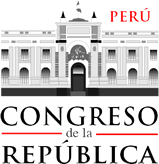
The Congress of the Republic of Peru is the unicameral body that assumes legislative power in Peru. Due to broadly interpreted impeachment wording in the Constitution of Peru, the President of Peru can be removed by Congress without cause, effectively making the legislature more powerful than the executive branch. Following a ruling in February 2023 by the Constitutional Court of Peru, the body tasked with interpreting the Constitution of Peru and whose members are directly chosen by Congress, judicial oversight of the legislative body was also removed by the court, essentially giving Congress absolute control of Peru's government. Since the 2021 Peruvian general election, right wing parties held a majority in the legislature. The largest represented leftist party in Congress, Free Peru, has subsequently aligned itself with conservative and Fujimorists parties within Congress due to their institutional power.
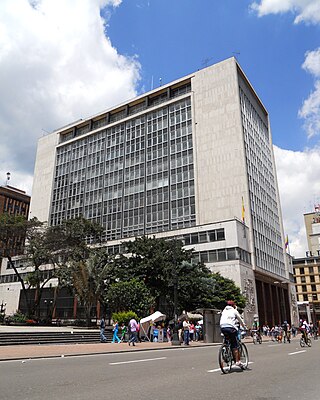
The Bank of the Republic is the central bank of Colombia. It was initially established under the regeneration era in 1880. Its main modern functions, under the new Colombian constitution were detailed by Congress according to Ley 31 de 1992. One of them is the issuance of the Colombian currency, the peso. The bank is also active in promoting financial inclusion policy and is a leading member of the Alliance for Financial Inclusion.

The Legislative Palace is a government building that serves as the seat of the Congress of Peru, the legislative branch of the Peruvian government. Located at Ayacucho street, it lies next to next to the Bolivar Square and forms part of the neighbourhood of Barrios Altos, itself part of the historic centre of Lima.

José Faustino Sánchez Carrión was a pro-independence politician from Peru. Also known as the "Solitario de Sayán", he had a decisive role in the establishment of the republican system of government in post-independence Peru. He was one of the writers of the first political constitution of Peru, of liberal tendencies. He later participated in the diplomatic mission which traveled to Guayaquil to invite Simon Bolivar to Peru. He died prematurely, victim of an unknown sickness.

Parliamentary elections were held in Colombia on 9 March 2014 to elect members to both chambers of Congress. The nationwide constituency for the 102-member Senate was contested, as well as the 166 seats of the House of Representatives, plus the delegates to the Andean Parliament. There were 773 candidates for the Senate, 1,528 candidates for the House of Representatives, and 23 candidates for the five Colombian seats in the Andean Parliament. 32,795,962 Colombians had been registered to vote in the elections by the cut-off date of 25 January 2014.
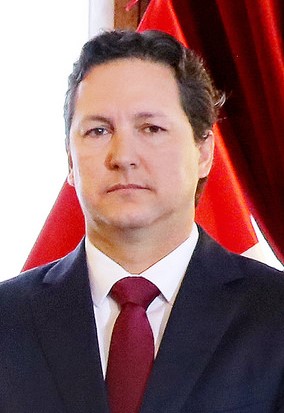
Daniel Enrique Salaverry Villa is a Peruvian architect, businessman and politician. Between 2016 and 2019, he served in Congress representing the Department of La Libertad. Elected to Congress under the Fujimorist Popular Force party, he was the party's spokesperson for a year, and was President of the Congress from 2018 to 2019. He ran as a candidate for the presidency of Peru for the We Are Peru party in the 2021 general elections.
Rank comparison chart of navies of North and South American states.
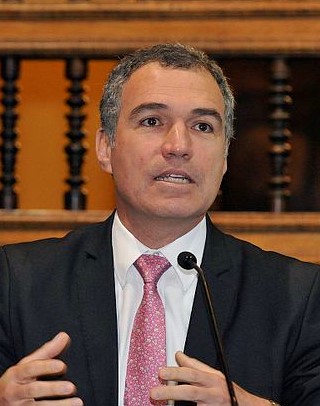
Salvador Alejandro Jorge del Solar Labarthe is a Peruvian actor, director and politician. He served as Prime Minister of Peru from March to September 2019, in President Martín Vizcarra's administration.
The Congress of Deputies is the lower house of Spain.
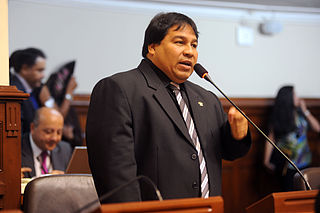
Martín Amado Rivas Texeira is a Peruvian politician and lawyer. He was elected as a Congressman of the Republic of Peru for the 2011–2016 period, representing the Lambayeque Department under the Nationalist-dominated Peru Wins ticket. He has been serving in Congress since March 2010 as the replacement for the disqualified Gustavo Espinoza. Rivas belongs to the Peruvian Nationalist Party.
Parliamentary elections were held in Colombia on 13 March 2022.

Sandra Ramírez Lobo Silva was a combatant in the Revolutionary Armed Forces of Colombia (FARC) from 1981 until the signing of the peace treaty in 2016. In 2018, she was elected to the Senate of Colombia for the Commons party.

On 7 December 2022, Pedro Castillo, the then-President of Peru, made an attempt to dissolve the Congress amidst looming removal proceedings. This move included the immediate imposition of a curfew, an attempt to establish an emergency government, and a call for the formation of a constituent assembly. Prior to this, Attorney General Patricia Benavides had accused Castillo of leading a criminal organization, a claim that contravened Article 117 of the Constitution of Peru. She had urged the Congress to remove him from office, leading to the third removal attempt against Castillo. Castillo defended his actions by arguing that the Congress, which had obstructed many of his policies, was serving oligopolistic businesses and had colluded with the Constitutional Court to undermine the executive branch, thereby creating a "congressional dictatorship". He also advocated for the immediate election of a constituent assembly, a demand that had been echoed since the 2020 Peruvian protests.